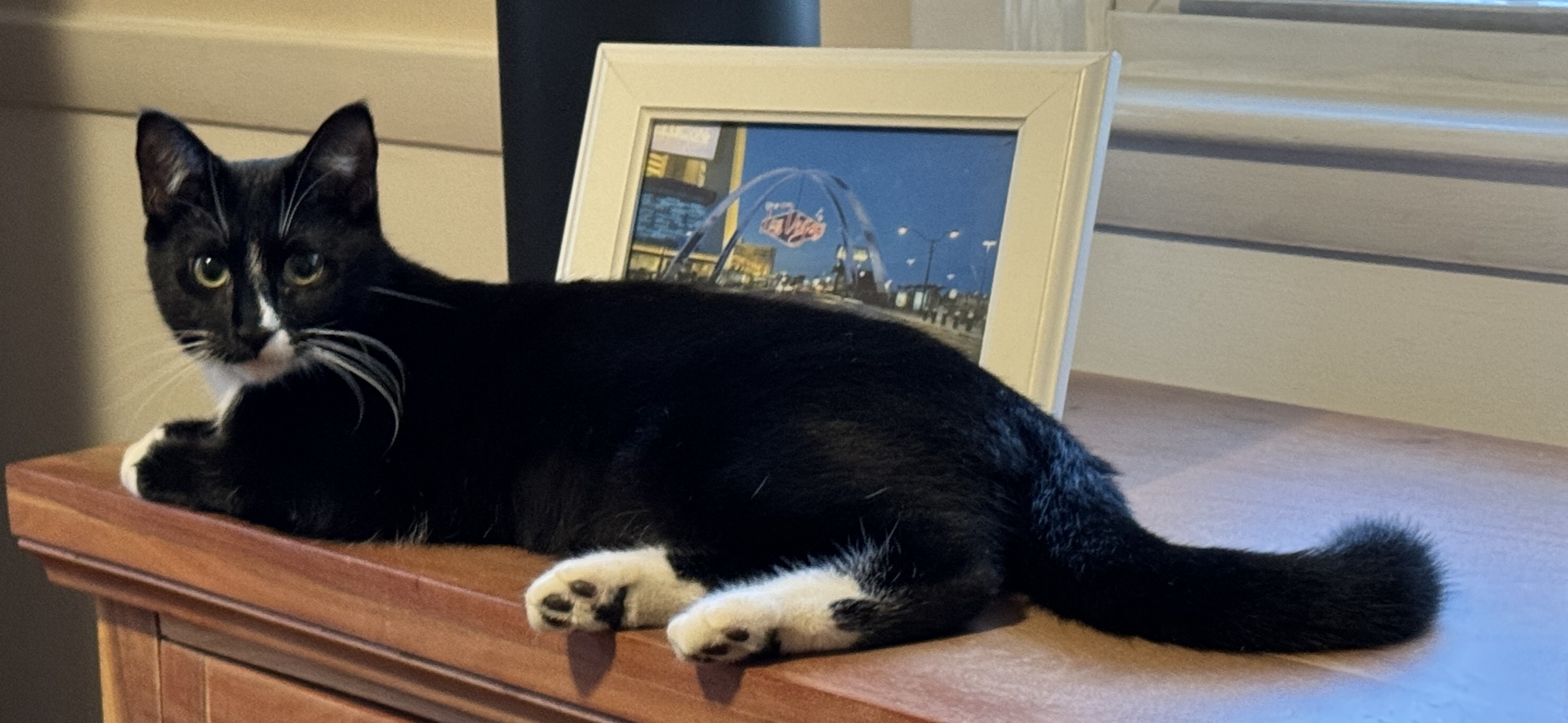Two of the Weirdest Albums of the 1970s
8 min read
This is an edition of The Atlantic Daily, a newsletter that guides you through the biggest stories of the day, helps you discover new ideas, and recommends the best in culture. Sign up for it here.
It’s Friday, and in the world of politics, it’s been a week that—to me, anyway—seems like a year. Monday was the first anniversary of the Hamas attack on Israel. On Wednesday, in my new cover story, I offered Atlantic readers a dark (but I hope inspiring) warning from George Washington about the election. Last night, Donald Trump experimented with a new campaign strategy: going to a major city in a swing state and dumping on it. “Our whole country will end up being like Detroit if [Kamala Harris] is your president,” he told the Economic Club of, yes, Detroit. “You’re going to have a mess on your hands.”
But it is also autumn, and the crisp air and falling leaves have me thinking about a favorite song, and the weird album that produced it. And so, I thought we might leave the stressful 21st century behind today and go back to the late 1970s, when people experimented with music—among other things—in ways that now seem quaint and quirky.
I have two strange musical artifacts to recommend to you. One of them I already mentioned briefly in The Daily more than a year ago: the British musician and producer Jeff Wayne’s freaky 1978 rock opus, Jeff Wayne’s Musical Version of The War of the Worlds.It features Richard Burton as the narrator, and he interacts with Phil Lynott of Thin Lizzy, Justin Hayward of the Moody Blues, and David Essex, among others.
The album is, in places, kind of dated: Some of the interspersed instrumentals are uncomfortably disco-ish, and a few of the numbers are forgettable. But I want to direct you to the biggest hit the project spawned, Hayward’s recording of “Forever Autumn,” a lush, Moody Blues–like paean to a lost love:
Through autumn’s golden gown we used to kick our way
You always loved this time of year
Those fallen leaves lie undisturbed now
’Cos you’re not here
It’s gorgeous, and you’ll hear it a lot as a stand-alone single on some stations during this time of year. But on the album, the song is intercut with Burton’s narrator seeking his fiancée, Carrie, as London descends into chaos under the Martian assault. He describes stumbling through the fleeing masses only to find that Carrie and her father have fled their cottage:
Fire suddenly leapt from house to house. The population panicked and ran. And I was swept along with them, aimless and lost without Carrie. Finally I headed eastward for the ocean, and my only hope of survival: a boat out of England …
Hayward then returns to sing “A gentle rain falls softly on my weary eyes / As if to hide a lonely tear.” Carrie is lost, and humanity isn’t far behind. “It was the beginning,” Burton intones over the music, “of the rout of civilization, of the massacre of mankind.”
Whew. At the end, the narrator reaches the Thames in time to see Carrie make it to safety on a steamer. It’s not casual listening, but that’s the point: If you need a little getaway from reality, put on your headphones and let Burton and Hayward take you to a world where ’70s synthesizers and Victorian-era prose unite to summon images of imperiled lovers fleeing the alien tripods attacking Big Ben.
If you need a really trippy getaway, I have one other strange excursion for you. For some reason, the late record producer Russ Regan thought it would be awesome to make a movie in which newsreels and movie clips from World War II were set to Beatles music. Why? Because he saw it in a dream, that’s why.
But wait: It’s hard to make money from Beatles songs that already exist, so why not make covers of all the songs using an eclectic mix of popular ’70s rock and pop artists, throw in some backing from two full orchestras, and issue a brand-new soundtrack album?
And that, briefly, is how the 1976 film All This and World War II came about. You’ve likely never seen it, because it was such a confusing bomb of a movie that Twentieth Century-Fox pulled it from theaters after two weeks, never to be released again. (It’s now circulating as a cult video here and there, and you can find clips on YouTube, but the movie company basically buried it in a salt mine and sealed the entrance.)
The album, however, survives, and it’s mesmerizing, in a train-wreck kind of way. A tiny bit of it is quite good. Ambrosia’s version of “Magical Mystery Tour” just barely made it into the top 40 in the United States, Bryan Ferry’s “She’s Leaving Home” is rather affecting, and the Four Seasons do a jaunty “We Can Work It Out” that is a reminder of how good a vocal group they were.
The lead singer of the Four Seasons, Frankie Valli, did not join them on “We Can Work It Out”; instead, he soloed on “A Day in the Life,” one of several oddball misfires on what was then a double-album set. (I owned it as a teen.) Peter Gabriel makes “Strawberry Fields Forever” arty and pretentious, while Helen Reddy gamely croons a watery version of “The Fool on the Hill.” (You can almost see her in spangly bell-bottoms holding a white microphone with two fingers, ’70s-style.) For some reason, Keith Moon shows up to sing “When I’m Sixty-Four,” and Tina Turner sneers her way through what is easily one of the worst versions of “Come Together” ever recorded.
The rest of the contributors include the Bee Gees (of course), Frankie Laine, the Brothers Johnson, Roy Wood, and even a European crooner named Richard Cocciante. It’s like a dimensional rip opened up between London and Los Angeles and just grabbed a random collection of musicians who were standing anywhere near electrical equipment and forced them to play for all eternity in the Beatles Multiverse.
I don’t know why this album still exists. But I admit that, every few years, I play it again to revisit the unnatural amalgam of warm sincerity and plastic commercialism that made the 1970s such a weird decade.
We’ll get back to politics next week. Until then, it’s Burton and the Beatles.
Related:
- The band that best captures the sound of the ’70s
- The secret joys of geriatric rock
Here are three new stories from The Atlantic:
- “I’m running out of ways to explain how bad this is.”
- Point Nemo, the most remote place on Earth
- This time, Bob Woodward gets it right.
Today’s News
- Israeli air strikes killed at least 22 people and injured more than 100 last night in Beirut, according to Lebanese officials.
- In a New York Times interview, Senator J. D. Vance of Ohio refused multiple times to say whether Donald Trump lost the 2020 election. He also said that he would not have certified the 2020 election results.
- FEMA’s chief said that although the agency’s budget can “support the immediate needs” of those who survived Hurricanes Helene and Milton, the agency will need supplemental funding from Congress soon.
Dispatches
- Work in Progress: Can you ignore a medical bill? The answer is less clear than you might think, Annie Lowrey writes.
- The Books Briefing: Recent works by Alan Hollinghurst and Lore Segal take two different approaches to growing old, Maya Chung writes.
Explore all of our newsletters here.
Evening Read

Another Reason to Hate Ticks
By Sarah Zhang
When Clark Giles first heard about ticks making people allergic to meat, he found the notion so unbelievable, he considered it “hogwash.” Then, in 2022, it happened to him. Following a spate of tick bites, he ate a hamburger and went into sudden anaphylaxis. His lips became numb, his face swollen, and his skin a “red carpet from my knees to my shoulders,” he says. Eventually, Giles—who raises sheep on a homestead in Oklahoma—had to give up eating not just beef but pork, and, yes, even lamb.
From there, his allergy started to manifest in stranger ways.
Read the full article.
More From The Atlantic
- The Russia hoax is still not a hoax.
- Loubna Mrie: Hezbollah waged war against the people of my country.
- Rumors on X are becoming the right’s new reality.
- The Trump-Obama split screen in Pennsylvania
- The wellness industry is manifesting a quantum world.
Culture Break

Drink. Shelf-stable milk is a miracle of food science that Americans just won’t drink, Ellen Cushing writes.
Watch (or skip). The Apprentice (out now in theaters) is a Donald Trump biopic that aims to avoid politics—and ends up being a shallow, murky portrait, Shirley Li writes.
Play our daily crossword.
P.S.

For months, my wife, Lynn, and I have been so touched by the kind words many of you sent when our beloved cat Carla passed away. We really debated whether we would get another cat; Carla was a hard act to follow. But we love animals, and the shelters are packed with little friends who need a home. Our first trip to a shelter didn’t end well; we were overwhelmed and had to leave. But a little over a month ago, we went back, and this time, we adopted a five-month-old kitten we’ve named Lily. (Carla was named for a character in the TV show Cheers, so we stayed with that theme: Lily’s full name is Lilith Carla Nichols.)
Many of you have asked about Lily, and I am happy to report that she is a normal, highly energetic tuxedo cat whose mood alternates between cuddly furball and murderous apex predator in a matter of seconds. Lily is the first kitten either Lynn or I have had since we were children; as an adult, I’d previously adopted only older rescues, including Carla, who was already two when I got her. Lily is a reminder that kittens areboth hilarious and exasperating. (Pet me! Nope, changed my mind—gotta bite you now.)
I am especially gratified to find that she is a very social cat. She wants to be wherever we are—which can be awkward, as cat owners know—and sleeps between us at night. When the grandchildren come by, she follows them around. She comes when called and checks out every visitor. (She can also eat her weight in kitten food about every 10 minutes, but she’s a growing girl.) I’ll keep you all posted.
— Tom
Stephanie Bai contributed to this newsletter.
When you buy a book using a link in this newsletter, we receive a commission. Thank you for supporting The Atlantic.



